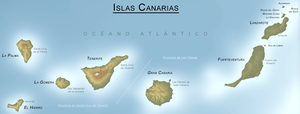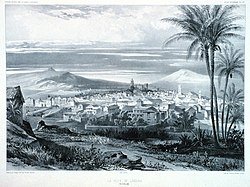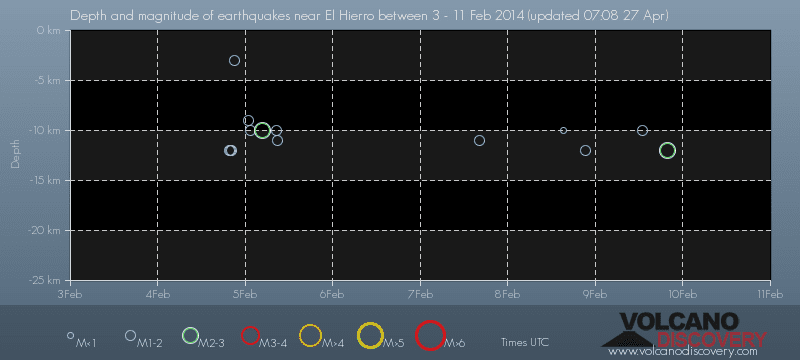-->

letztes Beben(Kanarische Inseln ( IGN)

Bebenmap( El Hierro)

GPS deformation measure stations on El Hierro
MODVOLC/ Hawaii thermal alerts:
^
near real time thermal alert
for El Hierro, la Palma, Teneriffe and la Gomera ( updated once per week)
volcano discovery. com : Earthquake within 30 km radius around El Hierro:
-------
---------------
February 10- 16- 2014
January 15- 19- 2014
January 20- 27- 2014

Mnt Teide ( Teneriffe)
VOLCANOES:
"Eruptions that shook the world"
a very interesting and freely avaible source how volcanoes work where you find all what you want to know about volcanoes
Sources of the volcanic activity at El Hierro ( since 2011):
Some may like to read a review on the volcanic activity below El Hierro in 2011:
Here is a data based report by earthquake .com- an excellent site regularly reporting (what you never get in the news) about Earthquakes and related volcanism
worldnews.com: Special environmental reports about the Canaries
Miscanellous:
Geschichte Teneriffas (deutsch)

Fataga ( Gran Canaria)

San Cristóbal de La Laguna in 1880 (Tenerife)

Caldera de Taburiente National Park (La Palma).

Garajonay (La Gomera)

(BBC/ 20111204)Canary Island volcano: A new island in the making?
:
:
CANARY ISLANDS- ISLAS CANARIAS- KANARISCHE INSELN | |||||||||||||||||||||||||||||||

BLOG/ Startseite
| |||||||||||||||||||||||||||||||
| internal links > | START | HOME | SOLAR BLOG | VOLCANO WATCH | VOLCANO MAPS | external links > | IGN | AVCAN | AVCAN/ fb. | EMSC | GVP | NOAA |

Activity report here will ony follow, if new events take place. For other environmental reports, please visit the solar and terrestrial blog on my homepage
-------------
La Palma, Canary Islands. Credit: CEDIDA
NEW INTENSIVE EARTHQUAKE SWARM BELOW CUMBRA VIEJA/ LA PALMA.
Data from IGN were only barely available since the website had been changed last year. Also not much happend since then. As expected the volcano system rather cooled down after the high activity during the last 11 years solar sun spot maximum ( 2010- 2014) has further decreased with only one but strong proton event in 2017, and is expected to resume around towards the next 11 yera sun spot maximum in 2022- 2024.
This minor serial of proton events until June 2017 however had a peak event that was extraordinary strong with the integral proton flux raising above 1.000 pfu for more than three days.
The immidiate heating effects on the earth mantle however were not as strong as during 2012- 2014 when one proton event folllowed the other accumulating their energies,( while almost all hot spots known worldwide were active) but nevertheless could be expected to be active for a longer time maybe a half year or more
Thus the activities now occuring on several hotspots such as the Yellowstone caldera, Mt Sinabung near the Toba caldera or as well as this new seimic swarm measured during the past days below La Palma / Canary Islands might be late effect of these proton events and must be taken in account in the learnng process that just has begun.
Here just some parts of a report published by the website " the watchers" ( thanks to there!) that describes the situation well:
"A new seismic swarm started under Cumbre Vieja volcano (La Palma), the Canary Islands on February 10, 2018. Quakes in this latest swarm are stronger than those in the previous swarm in October 2017, the first swarm in this area in 30 years.
National Geographic Institute (IGN) registered a total of 83 earthquakes between 23:23 UTC, February 10 and 07:32 UTC, February 15 with magnitudes ranging from 1.6 to 2.6.
In addition, there have been several hundred more which weren't detected due to their magnitude and depth.The depth of the quakes decreased during the course of the swarm, suggesting an upward movement of magma towards the surface.
The Canary Government called for an urgent meeting of the Scientific Committee for Evaluation and Monitoring of Volcanic Phenomena to discuss why the quakes are happening again and what might happen in the future. This is the second such meeting in four months.
INVOLCAN said that this new series is something expected based on geochemical measurements made in the Cumbre Vieja volcano.
-------------
La Palma, Canary Islands. Credit: CEDIDA
FEBRUARY 18- 2018
NEW INTENSIVE EARTHQUAKE SWARM BELOW CUMBRA VIEJA/ LA PALMA.
Data from IGN were only barely available since the website had been changed last year. Also not much happend since then. As expected the volcano system rather cooled down after the high activity during the last 11 years solar sun spot maximum ( 2010- 2014) has further decreased with only one but strong proton event in 2017, and is expected to resume around towards the next 11 yera sun spot maximum in 2022- 2024.
This minor serial of proton events until June 2017 however had a peak event that was extraordinary strong with the integral proton flux raising above 1.000 pfu for more than three days.
The immidiate heating effects on the earth mantle however were not as strong as during 2012- 2014 when one proton event folllowed the other accumulating their energies,( while almost all hot spots known worldwide were active) but nevertheless could be expected to be active for a longer time maybe a half year or more
Thus the activities now occuring on several hotspots such as the Yellowstone caldera, Mt Sinabung near the Toba caldera or as well as this new seimic swarm measured during the past days below La Palma / Canary Islands might be late effect of these proton events and must be taken in account in the learnng process that just has begun.
Here just some parts of a report published by the website " the watchers" ( thanks to there!) that describes the situation well:
"A new seismic swarm started under Cumbre Vieja volcano (La Palma), the Canary Islands on February 10, 2018. Quakes in this latest swarm are stronger than those in the previous swarm in October 2017, the first swarm in this area in 30 years.
National Geographic Institute (IGN) registered a total of 83 earthquakes between 23:23 UTC, February 10 and 07:32 UTC, February 15 with magnitudes ranging from 1.6 to 2.6.
In addition, there have been several hundred more which weren't detected due to their magnitude and depth.The depth of the quakes decreased during the course of the swarm, suggesting an upward movement of magma towards the surface.
The Canary Government called for an urgent meeting of the Scientific Committee for Evaluation and Monitoring of Volcanic Phenomena to discuss why the quakes are happening again and what might happen in the future. This is the second such meeting in four months.
INVOLCAN said that this new series is something expected based on geochemical measurements made in the Cumbre Vieja volcano.
GOOGLE BLOG ARCHIVE
|
Seitenzahl: 03
|
| Latest Post |
| BLOG START/ NAVI |
useful links/ nützliche Links:
|
| EMSC |
| Global Volcanism Program |
| Facebook Seite der AVCAN |
| IGN (Spain) Serie El Hierro |
| Volcano-discovery.com |
| Earthquake- report. com |
MEDIEN:
|
KARTEN:
|
SOLAR (SAT)
|
SOLAR (info)
|
REAL TIME FEATURES:
(click on the images to enlarge them)
(click on the images to enlarge them)

Bebenmap( El Hierro)

GPS deformation measure stations on El Hierro
MODVOLC/ Hawaii thermal alerts:
^
near real time thermal alert
for El Hierro, la Palma, Teneriffe and la Gomera ( updated once per week)
volcano discovery. com : Earthquake within 30 km radius around El Hierro:
-------
---------------
previous posts those contain articles about the Canary volcanism in general:
February 10- 16- 2014
January 15- 19- 2014
January 20- 27- 2014

Mnt Teide ( Teneriffe)
related free online sources:
VOLCANOES:
"Eruptions that shook the world"
a very interesting and freely avaible source how volcanoes work where you find all what you want to know about volcanoes
Sources of the volcanic activity at El Hierro ( since 2011):
Some may like to read a review on the volcanic activity below El Hierro in 2011:
Here is a data based report by earthquake .com- an excellent site regularly reporting (what you never get in the news) about Earthquakes and related volcanism
worldnews.com: Special environmental reports about the Canaries
Miscanellous:
Geschichte Teneriffas (deutsch)

Fataga ( Gran Canaria)

San Cristóbal de La Laguna in 1880 (Tenerife)

Caldera de Taburiente National Park (La Palma).

Garajonay (La Gomera)

(BBC/ 20111204)Canary Island volcano: A new island in the making?




Keine Kommentare:
Kommentar veröffentlichen